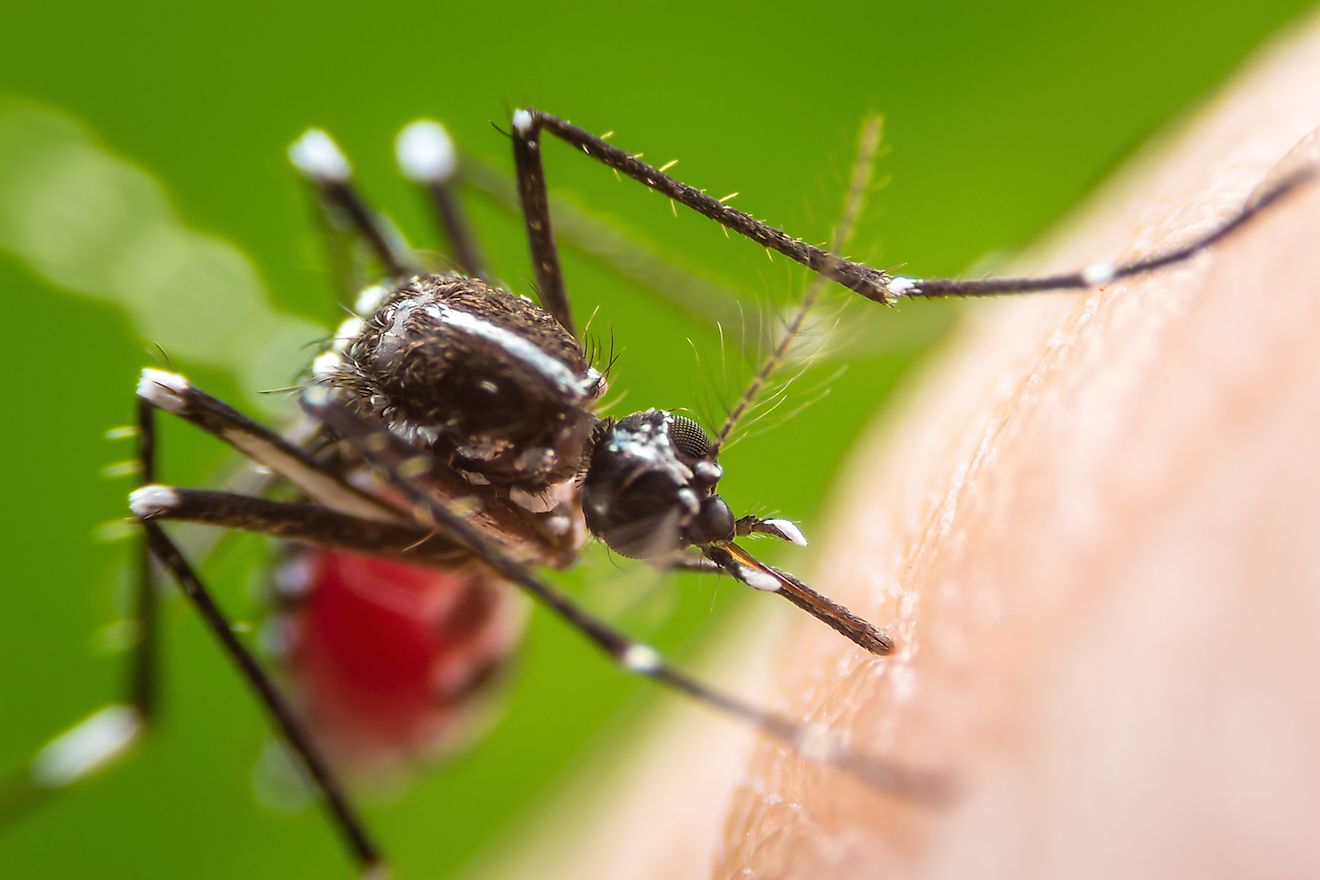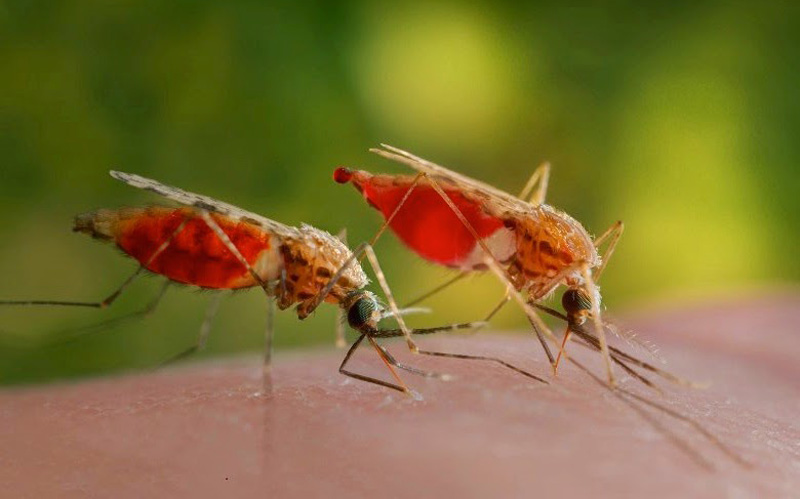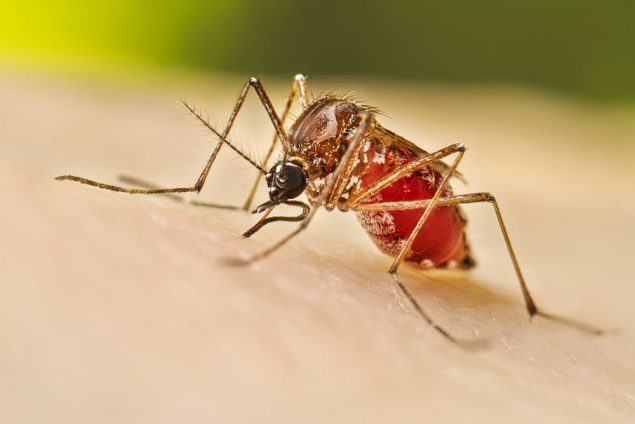Over one million people worldwide die from mosquito-borne diseases every year due to mosquito bites. Mosquitoes are responsible for causing more human suffering than any other organism, leading to significant mortality rates globally.
These tiny insects are carriers of various diseases that can have fatal consequences, affecting both humans and animals. Mosquito-borne illnesses such as malaria, dengue fever, yellow fever, and Zika virus pose a significant threat to public health, resulting in substantial death tolls annually.
The impact of mosquito-borne diseases transcends borders, making it a critical global health concern that necessitates concerted efforts in prevention and control strategies to mitigate the risks associated with mosquito bites.

Credit: www.worldatlas.com
The Deadly Impact Of Mosquitoes
Mosquitoes are not just pesky insects; they pose a significant threat to human health worldwide. The deadly impact of mosquitoes is evident through the global mortality rates and comparative death tolls attributed to mosquito-borne diseases.
Global Mortality Rates
Each year, over one million people worldwide succumb to mosquito-borne diseases, making mosquitoes the deadliest animals on the planet. These diseases, including malaria, dengue fever, Zika virus, and West Nile virus, are responsible for a staggering number of fatalities, particularly in regions with limited access to healthcare and preventive measures.
Comparative Death Tolls
When comparing the death tolls caused by various organisms, mosquitoes outpace all others in terms of human suffering. Notably, the prevalence of mosquito-borne diseases results in a higher mortality rate than many other infectious diseases combined, emphasizing the urgent need for comprehensive mosquito control and prevention strategies.
Disease Transmission By Mosquitoes
Mosquitoes are responsible for over one million deaths worldwide each year due to mosquito-borne diseases. These tiny insects not only afflict humans but also transmit diseases to dogs and horses.
Common Mosquito-borne Diseases
- Malaria
- Dengue fever
- Zika virus
- West Nile virus
Mechanisms Of Disease Spread
- Vector-borne transmission: Mosquitoes act as vectors, transmitting pathogens from one host to another through their bites.
- Saliva exchange: When mosquitoes feed on blood, they inject saliva containing pathogens into the host’s bloodstream.
Geographical Variations In Mosquito-related Deaths
Mosquito-related deaths vary significantly across different geographical regions, with certain countries and zones experiencing a higher impact than others. Understanding these geographical variations is crucial in implementing targeted preventive measures and addressing the global health burden posed by mosquito-borne diseases.
Mosquito Deaths By Country
When analyzing mosquito-related deaths, it’s essential to consider the geographical distribution of these fatalities. Some countries bear a disproportionately high burden of mosquito-borne diseases, leading to a greater number of fatalities. For instance, regions in sub-Saharan Africa and Southeast Asia report a significant number of deaths attributed to mosquito bites due to the prevalence of diseases such as malaria, dengue fever, and Zika virus.
Impact In Tropical Vs. Temperate Zones
The impact of mosquito-related deaths varies between tropical and temperate zones. Tropical regions, characterized by warm and humid climates, provide ideal breeding grounds for mosquitoes, leading to a higher prevalence of mosquito-borne diseases and subsequently, increased fatalities. In contrast, temperate zones experience lower incidences of mosquito-related deaths due to less favorable environmental conditions for mosquito propagation and lower disease prevalence.
Annual Statistics And Trends
Mosquito-borne diseases result in over one million deaths annually worldwide. These diseases not only afflict humans but also affect dogs and horses. The impact is significant, making it crucial to address and prevent mosquito-borne illnesses.
Annual Statistics and Trends: Mosquito deaths per year worldwideMosquitoes are considered the deadliest animals on the planet, responsible for more human deaths than any other organism. According to the American Mosquito Control Association, over one million people worldwide die each year from mosquito-borne diseases. Mosquitoes are known to transmit several diseases, including malaria, dengue fever, Zika virus, and West Nile virus, among others. The following table shows the number of estimated deaths caused by mosquito bites per year worldwide.| Year | Estimated Mosquito Deaths Worldwide |
|---|---|
| 2016 | 830,000 |
| 2017 | 810,000 |
| 2018 | 770,000 |
| 2019 | 750,000 |
| Year | Estimated Mosquito Deaths Worldwide | Year-over-Year Change |
|---|---|---|
| 2016 | 830,000 | N/A |
| 2017 | 810,000 | -2.4% |
| 2018 | 770,000 | -5.0% |
| 2019 | 750,000 | -2.6% |
Mosquitoes Vs. Human Warfare
Mosquitoes cause over one million human deaths annually worldwide due to mosquito-borne diseases. These tiny pests are responsible for more human suffering and fatalities than any other organism on the planet.
Historical Context Of Mosquito Fatalities
Mosquitoes have been responsible for countless fatalities throughout human history, particularly in areas where mosquito-borne diseases are prevalent. In fact, mosquitoes have caused more human suffering and deaths than any other organism. According to the American Mosquito Control Association, over one million people worldwide die from mosquito-borne diseases every year. Mosquito-borne diseases include malaria, dengue fever, Zika virus, yellow fever, and West Nile virus, to name a few.Mosquitoes In Warzones
Mosquitoes don’t discriminate between civilians and soldiers, and they can be just as deadly as any weapon used in war. In fact, mosquitoes have played a significant role in many wars throughout history. During World War II, more American soldiers died from mosquito-borne diseases like malaria than from combat. Mosquitoes were also responsible for spreading yellow fever among Napoleon’s troops during his failed invasion of Haiti in the late 1700s.To combat the threat of mosquito-borne diseases in warzones, soldiers are often provided with mosquito nets, repellents, and other preventive measures. However, these measures are not foolproof, and many soldiers still fall victim to mosquito-borne diseases. In recent years, the military has been working on developing new technologies to combat mosquito-borne diseases, such as genetically modified mosquitoes that are resistant to the diseases they carry.In conclusion, mosquitoes have been responsible for countless deaths throughout human history, and they continue to be a threat to public health and safety today. It’s important to take preventive measures against mosquito bites, such as wearing mosquito repellent and using mosquito nets. By taking these precautions, we can reduce the number of fatalities caused by mosquito-borne diseases and ensure that we’re better equipped to fight mosquitoes in warzones.Credit: www.quora.com
Preventive Measures And Control
Preventive measures and control are crucial in reducing mosquito-borne disease deaths. Over one million people worldwide die annually from mosquito-related illnesses, making mosquitoes the deadliest disease vector. Implementing effective mosquito control strategies is essential to mitigate the impact of mosquito bites on human health.
Mosquitoes are not just pesky insects; they pose a significant health risk due to the diseases they transmit. Implementing effective preventive measures and control strategies is crucial to mitigate this risk and safeguard public health. Let’s explore some strategies for mosquito controleffectiveness of public health campaigns in combating these disease-carrying pests.Strategies For Mosquito Control
mosquito control, employing a multi-faceted approach is essential. This includes eliminating standing water where mosquitoes breed, using insecticides, and implementing biological control methods such as introducing natural predators. Additionally, community engagement and education are vital in promoting personal protective measures and reducing potential mosquito breeding sites in residential areas.Effectiveness Of Public Health Campaigns
Public health campaigns play a pivotal role in raising awareness about the dangers of mosquito-borne diseases and disseminating information on preventive measures. These campaigns utilize various mediums such as social media, educational materials, and community events to educate the public about the importance of using mosquito repellents, wearing protective clothing, and securing homes with screens and nets. Evaluating the effectiveness of public health campaigns through targeted surveys and data analysis is crucial for refining these initiatives and ensuring their impact on reducing mosquito-borne illnesses.In conclusion, implementing comprehensive strategies for mosquito control and assessing the effectiveness of public health campaigns are fundamental steps in mitigating the impact of mosquito-borne diseases on public health. By integrating these measures, we can work towards creating safer and healthier environments for communities worldwide.Mosquito-related Health Risks In Domestic Animals
Mosquitoes pose a significant threat to human and animal health worldwide. Over one million people die annually from mosquito-borne diseases, including dogs and horses susceptible to these illnesses. Preventing mosquito bites is crucial to avoid potential health risks associated with the diseases they carry.
Impact On Dogs And Horses
Mosquitoes can transmit diseases and parasites that pose significant health risks to dogs and horses. These animals are highly susceptible to vector-borne illnesses carried by mosquitoes.
Prevention In Pets
Protecting your pets from mosquito bites is crucial in preventing the spread of diseases. Using mosquito repellent products specifically designed for animals can help reduce the risk of infections.

Credit: www.outdoors.org
Myths And Misconceptions
When it comes to mosquito bites, there are several myths and misconceptions that can lead to confusion and misinformation. It’s essential to separate fact from fiction to understand the real risks and necessary precautions.
Clarifying Skeeter Syndrome
Skeeter Syndrome is a rare but real allergic reaction to mosquito bites. Contrary to popular belief, it can affect individuals of any age, not just babies and children. The severity of the reaction varies, and while it’s uncommon, it’s essential to recognize the potential for allergic responses to mosquito saliva.
The Truth About Sleeping With Mosquitoes
Many people believe that it’s safe to sleep in the same room with mosquitoes. However, this misconception can lead to an increased risk of mosquito bites and potential exposure to diseases. It’s crucial to take measures to eliminate mosquitoes from sleeping areas to reduce the likelihood of bites and associated health risks.
Frequently Asked Questions
How Many People Died From Mosquito Bites?
Mosquitoes cause over one million deaths globally each year due to mosquito-borne diseases.
How Rare Is Skeeter Syndrome?
Skeeter Syndrome is rare, but some people are more likely to get it than others. Babies and children are most susceptible due to lower immunity.
Is It Safe To Sleep With A Mosquito In Your Room?
Sleeping with a mosquito in your room is not safe as they can transmit diseases. It’s best to eliminate them.
Conclusion
The impact of mosquito-borne diseases is significant, causing over a million deaths annually worldwide. Mosquitoes pose a serious threat to human health, transmitting various diseases. Preventative measures are crucial to reduce the risk of mosquito-related illnesses and fatalities. Stay informed and protected against these deadly insects.
Related posts:

I’m MD Tanvir, and I bring years of expertise gained from working closely with pest control companies to the forefront. My journey in the industry has inspired me to launch Bug Battler, a platform aimed at equipping people with the know-how to combat pests autonomously. Through Bug Battler, I aim to empower individuals with practical insights to tackle pest infestations effectively.

